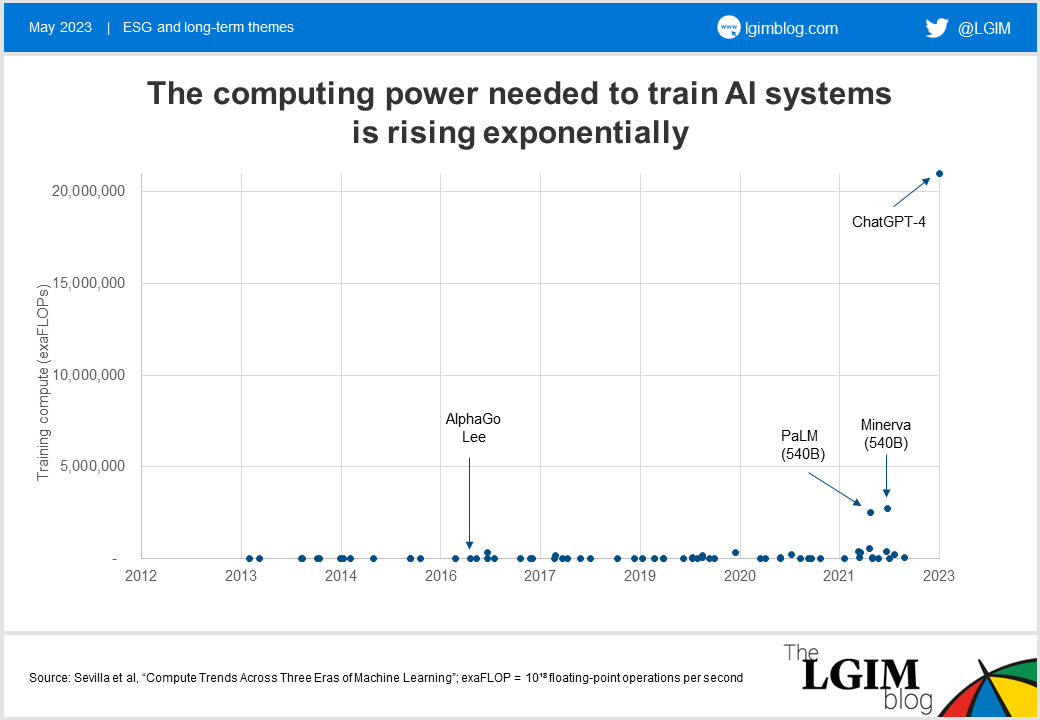Disclaimer: Views in this blog do not promote, and are not directly connected to any L&G product or service. Views are from a range of L&G investment professionals, may be specific to an author’s particular investment region or desk, and do not necessarily reflect the views of L&G. For investment professionals only.
Think AI is amazing? Wait until it meets quantum computing
Artificial intelligence (AI) is running up against the limits of today's computers. Quantum hardware could herald a new era of machine learning, with profound implications for humanity.

ChatGPT provided a wake-up call for anyone who thought widespread use of AI was science fiction. Following the chatbot’s rise to fame, companies raced to integrate AI into their publicly facing platforms to ride the wave of excitement.
Beyond saving time and increasing labour productivity, AI could one day provide answers to complex, critical problems such as climate change and hereditary disease.
Another technology with potential to revolutionise society is quantum computing (QC). These machines – which exist but remain at an experimental stage today – can solve problems that are out of reach for conventional computers in record time.
There are parallels between AI and QC, but a convergence of the two technologies could herald a new era of machine learning.
AI reaches the limits of today’s computers
Large language models (LLMs) such as ChatGPT provide an example of the challenge facing AI. The basis of ChatGPT’s power is a huge training dataset providing enough raw material for the chatbot to provide human-like responses to a limitless range of input requests.
But as the size of datasets grows exponentially, so too does the level of computing power needed to process them.

Taking the example of ChatGPT, it has around 175 billion parameters. As these models grow to trillions of parameters, the training requirement will become impractical using existing hardware. Quantum AI systems, however, could be built on this scale while using less energy and requiring less storage.
In contrast to ‘classical’ computers, which use the binary states of 0 and 1, QC uses quantum entanglement to achieve a third state roughly equivalent to both 0 and 1. What this means in practical terms is that operations that are slow to perform on classical computers (including processing huge datasets like those used by LLMs) could be solved much faster thanks to quantum algorithms.1
What could quantum AI achieve?
Quantum AI presents opportunities to increase efficiency across numerous industries, not to mention the potential of entirely new solutions to longstanding challenges facing humanity. Potential applications for quantum AI could include:
- More sophisticated voice recognition with the ability to deeply understand natural language commands and requests
- Autonomous driving systems that are able to process the vast amount of data collected by both in-car sensors and cloud-based traffic data
- Highly targeted medical treatments that make full use of advances in human genome mapping
- Advanced meteorological modelling, allowing us to predict extreme climate events before they happen with greater accuracy and range
Are we headed for a ‘cryptopocalypse’?
As is so often the case with technology, advances in QC present threats as well as opportunities.
The focus of concerns around QC is the possibility of a ‘cryptopocalypse’. Modern cryptography relies on the difficulty of solving a particular type of factorising problem computationally. Not only could QC theoretically eliminate this problem, but the algorithm to do so already exists.2
If QC hardware advances sufficiently, the cryptography used to secure millions of payments, websites and communications could become useless overnight. This potential scenario is driving investment from government agencies and corporates into quantum-proof encryption as well as quantum hardware.3
With these systems still in their infancy but advancing exponentially, we’ve only have scratched the surface of understanding what they might one day achieve.
1. Source: Quantum Supremacy using a Programmable Superconducting Processor – Google Research
3. Source: US taps startup QuSecure for post-quantum cybersecurity | ZDNET; IonQ Secures Contract to Provide Quantum Solutions to United States Air Force Research Lab; Vodafone quantum cryptography deal with IBM revealed (techmonitor.ai)
Recommended content for you
Learn more about our business
We are one of the world's largest asset managers, with capabilities across asset classes to meet our clients' objectives and a longstanding commitment to responsible investing.

